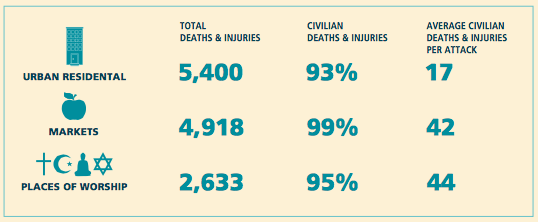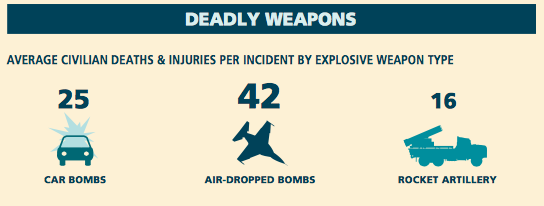Last year, at least 33,307 civilians were reported killed or injured by explosive weapons around the world, according to Action on Armed Violence (AOAV)’s latest annual report to review the casualty data gathered by their explosive violence survey, ‘Unacceptable harm: Monitoring explosive violence in 2015‘. The 2015 figures represent 54% more casualties than in 2011, when AOAV began monitoring incidents of explosive violence using English-language media reports. Reported casualties also increased 2% on last year – meaning that casualties from explosive weapons recorded by the survey have risen for four consecutive years. Fewer incidents were recorded by AOAV than in 2014 however, meaning that the average lethality of incidents in the dataset had also increased.
The countries suffering the most from explosive violence in 2015, in terms of civilians killed and injured by these weapons, were Syria, Yemen, Iraq, Nigeria and Afghanistan. More than 10,000 deaths and injuries from explosive weapons were recorded by AOAV in Syria alone, where the use of explosive weapons in populated areas has caused devastation in communities and contributed to mass displacement.

© Action on Armed Violence 2016
In AOAV’s 2015 data, 76% of all casualties recorded in 2,170 reported incidents were civilians. When explosive weapons were reported to have been used in populated areas, 92% of those killed or injured were civilians, compared to 31% in other areas. Air-launched weapons accounted for 9,200 civilian deaths and injuries – a rise of 57% on 2014, from fewer recorded incidents, suggesting that tactics such as airstrikes were being used in such a way as to cause greater civilian harm worldwide this year.

© Action on Armed Violence 2016
Incidents were recorded by AOAV in sixty-four countries and territories in 2015: twenty-three of these had no reported incidents in 2014. The countries showing the most significant rise in civilian deaths and injuries from explosive weapons compared to 2014 were Turkey, Yemen, Egypt, Libya, Syria and Nigeria.
International action and the need for a global response
In the context of the rising toll of explosive violence on civilians, a global response from states is urgently needed in order to protect communities and prevent harm from the use of explosive weapons in populated areas, particularly those with wide area effects. Efforts are already under way towards an international political commitment to begin to address this issue, led by Austria, and over fifty states as well as the UN Secretary-General and the International Committee of the Red Cross have recognised the humanitarian harm caused by explosive weapons.
Next month in Istanbul, states will meet for the World Humanitarian Summit, which will aim to address some of the most serious challenges that states, international organisations and civil society face in responding to the needs of people caught up in conflict, disasters and other crises. The UN Secretary-General recognised the use of explosive weapons in populated areas as a key humanitarian issue that must be addressed in his report ahead of the summit. Explosive weapons were identified as an important area of concern under the second “core responsibility” he identities for states, which is to uphold the international laws and norms that safeguard humanity.
At the summit, states and organisations are called on to make commitments on the areas identified in the UN Secretary-General’s report, with a range of ‘Core Commitments’ proposed in advance for discussion at Roundtables at the summit covering these different areas. States and others can align with some or all of the core commitments as an outcome of the summit. The roundtable on ‘upholding the norms that safeguard humanity’ includes a core commitment on explosive weapons:
Core commitment 2: Commit to promote and enhance the protection of civilians and civilian objects, especially in the conduct of hostilities, for instance by working to prevent civilian harm resulting from the use of wide-area explosive weapons in populated areas, and by sparing civilian infrastructure from military use in the conduct of military operations.
INEW encourages all states and other stakeholders to endorse this commitment, as part of an international response to the grave humanitarian harm caused by the use of explosive weapons in populated areas.
